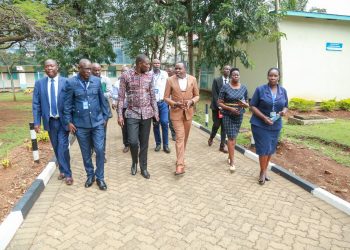The Kenya Paediatric Research Consortium (Keprecon), through its Championing Evidence-Based Advocacy (CEBA) project, has forged a transformative alliance with religious leaders from Mandera, Wajir, and Isiolo counties.
According to health experts the initiative aims to directly address the alarmingly low uptake of the Human Papilloma-virus (HPV) vaccine while simultaneously bolstering Primary Health Care (PHC) and Reproductive, Maternal, Neonatal, Child, and Adolescent Health and Nutrition (RMNCAH+N) across the region.
This strategic partnership officially launched during a high-level knowledge-sharing forum held on Monday. The impactful event convened not only influential religious leaders but also key county health officials and senior political figures, including the Deputy Governor of Mandera and the First Ladies of Wajir and Isiolo counties.
The presence of representatives from the Supreme Council of Kenya Muslims (SUPKEM) further underscored the widespread support from both faith-based organizations and governmental sectors.
Professor Fredrick Were, a distinguished Professor of Perinatal and Newborn Medicine and Chief Executive Director of Keprecon, emphasized the critical importance of involving trusted community voices in public health endeavors.
He explained that the forum was specifically designed to dismantle deep-seated cultural and religious misconceptions that have historically hindered vaccine acceptance. “When we empower religious leaders with evidence-based information that resonates with their faith and values,” he stated, “we create a stronger, more culturally rooted foundation for effective health advocacy.”
The meeting was meticulously structured around four primary objectives: to significantly raise awareness about the HPV vaccine’s pivotal role in preventing cervical cancer; to directly address and clarify the cultural and religious concerns that have slowed its acceptance; to decisively strengthen religious leaders’ roles in health advocacy; and to actively encourage robust community ownership and local resource mobilization for broader RMNCAH+N efforts.
Sheikh Abdi Hussein, a respected religious leader from Wajir, enthusiastically welcomed the initiative, describing it as both timely and transformative. He powerfully articulated that religious guidance and health education could, and should, coexist in mutual reinforcement. “There is nothing in our faith that opposes protecting our daughters from disease,” he affirmed. “We now have the responsibility to return to our mosques and communities and speak with truth—guided by both scripture and science.”
Throughout the forum, compelling data presented by health experts revealed a concerning trend of persistently low vaccine uptake across Northeastern Kenya. Routine immunizations and the HPV vaccine, in particular, remain alarmingly underutilized. This dire situation is largely attributed to widespread misinformation, pervasive religious doubts, and a stark lack of access to accurate health information, all of which have significantly contributed to poor maternal and adolescent health outcomes in the region.
Professor Were acknowledged these entrenched systemic issues and stressed the urgent need for a highly targeted approach. “We are witnessing the harsh consequences of health inequity rooted in both historical neglect and critical information gaps,” he observed. “By equipping those most respected in society—our religious leaders—with the right knowledge, we unlock the potential for real and sustainable behavioral change.”
The robust presence of high-level political leaders, including the Deputy Governor and county first ladies, unequivocally added significant momentum to the campaign. Their participation signaled a clear and growing political will to prioritize RMNCAH+N services in marginalized regions. Moreover, their engagement highlighted the crucial importance of collaborative, multisectoral advocacy involving both governmental and community-based actors.
Keprecon reaffirmed its unwavering commitment to long-term engagement with both faith and political leaders in the region,through sustained knowledge-sharing and evidence-based advocacy, the organization aims to ensure that every girl in Kenya—regardless of her location—can access life-saving interventions like the HPV vaccine, and that communities are fully empowered to take decisive ownership of their health futures.















